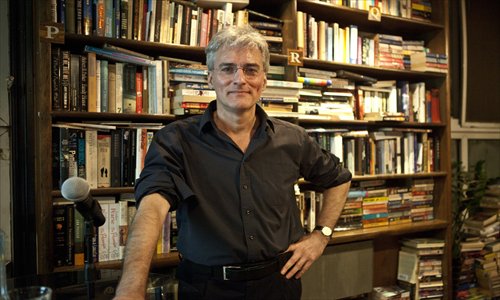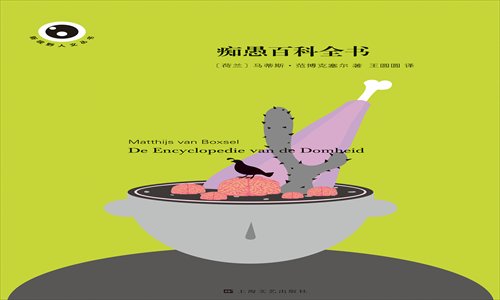Ode to fools

Dutch literary historian Matthijs van Boxsel thrives on stupidity. The 55-year-old author from Amsterdam is a morosopher, or an expert who studies stupidity. He has written a thesis about imbecility and has made his living writing, lecturing and teaching the topic at universities and businesses for the past 22 years.
The author traveled earlier this month to China for the first time to participate in a series of lectures and launch the Chinese edition of his revered book The Encyclopedia of Stupidity (1999) - a witty A-Z guide on silliness that has been translated in 16 languages.
Van Boxsel believes cartoon critter Bugs Bunny is a Zen master. He uses fairy tales, science fiction and newspaper stories to explain stupidity, and cites research on the specific gravity of a kiss.
"Stupidity is unwitting self-destruction," he explained. "It is the ability to act against one's best interests, with death as the extreme consequence. It's a talent that is typically human."
Van Boxsel wants to convince us that stupidity is "not a failing, but a force" key for intelligence as the engine that drives our civilization. Outspoken and admittedly arrogant, his idiocy is as sharp and amusing as his intelligence.

A Chinese copy of his book The Encyclopaedia of Stupidity. Photo: Guo Yingguang/GT, courtesy of the Shanghai Literature and Art Publishing Group
Rewriting stupidity
As a student of comparative literature, van Boxsel was the only one among his peers at university who would wear a suit and tie to class combined with eye makeup. "Just for the sheer boldness of the subject, I chose stupidity. It's a risky choice, and people can't wait to see you make a mistake," he noted. He settled on his subject matter around 30 years ago after reading the book The Man Without Qualities (1930) by Austrian author Robert Musil.
"The blind rage and paralyzing shame when confronted with my own stupidity and that of my friends was already there. It was bad for my stomach, so I had to find a way out," he recalled. "The other side to this was my anger. I was looking for the tools to dissect political stupidity."
Van Boxsel's research resulted in a series of books and essays, among which The Encyclopedia of Stupidity was the first published. In short chapters with titles such as "Genealogy of Idiots" and "Fools in Hell," the author uses an assortment of cartoons, fairy tales and anecdotes both factual and fictional to analyze stupidity.
Van Boxsel examines foolish figures such as Greek king Midas who famously turned everything he touched to gold and the stereotypical "dumb blonde." He also tackles previous winners of the Darwin Awards, which recognizes individuals' contribution to evolution by killing themselves in foolish circumstances thus proving van Boxsel's point that stupidity is at the core of human civilization.
"It's not a rancorous or gloomy book. It's a serious attempt to understand the mechanisms of stupidity," he said, labeling his index as "optimistic and festive."
"On one hand, stupidity poses a daily threat to civilization," he writes in the book. "Yet on the other hand, it constitutes the mystical foundation of our existence … for if man was not to fall victim to his own stupidity, he would not need to develop his intelligence."
Source of inspiration
Everyone must face the fact that nobody is intelligent enough to understand their own stupidity, according to van Boxsel. Assuming that stupidity is a necessary force, the author claims that our culture is the product of a "series of failed attempts to comprehend stupidity," which he affectionately labels a "key condition for intelligence."
"Unlike animals which have instincts for self-preservation, humans are prepared to risk themselves and their kind for some crazy idea about race, nation or belief," he told Metro Beijing. "To avoid being destroyed by their stupidity, humans were forced to develop the intelligence. Intelligence is nothing but the result of our vain efforts to understand our own stupidity."
But if stupidity is bliss and inherent in us all, why isn't everybody happy? Van Boxsel argues the key to this lies in watching the movies or reading the comics of Batman. "In Gotham, the city of fools, all the paradoxes are exemplified. Batman is his own greatest enemy, which shows that no one is intelligent enough to understand his own stupidity," he explained.
Readers of van Boxsel's book are also invited to discover the Buddhist morals hidden in cartoons, specifically Bugs Bunny who he describes as a "Zen master" hanging in mid-air. The carrot-eating rascal uses stupidity, not anger, to tackle adversity, van Boxsel argues.
"Our castles of knowledge are hanging in mid-air as well, unfounded but nevertheless productive. Too much knowledge can be fatal for our morals. The most immoral and stupid acts have been done in the name of superior morals," he said.
Pursuit of 'colorful' stupidity
A firm believer that stupidity is universal who insists it manifests everywhere and all the time, van Boxsel admitted it's difficult to chart the different degrees of stupidity.
"The problem is most people are stupid in a gray, banal way," the author noted, adding few people are stupid in an "original, colorful way."
"To my surprise, stupidity is defined in most cultures as lacking sensitivity, taste and style; it's very hard to find differences. The emphasis changes with time and place, but the self-destructive component is constant," van Boxsel said.
The Dutch author lamented that his inability to understand Chinese had prevented him from learning more about one of his idols, Chinese philosopher Zhuang Zi (369BC-286BC).
"There's a link between tao [literally "the way" in Taoism] and pataphysics [study of the impossible], but I still have to work them out," he noted. "They both accept the world in its idiocy and they both look at it with genuine interest, without the belief they might change something for the better."
Stupidity is one of the only things in the world that is constant, van Boxsel said, adding he finds this "reassuring."
"What would the world be like without stupidity? It would be a boring paradise. We would be pining for the fall. Since you can't escape stupidity, you might as well enjoy it," he said.